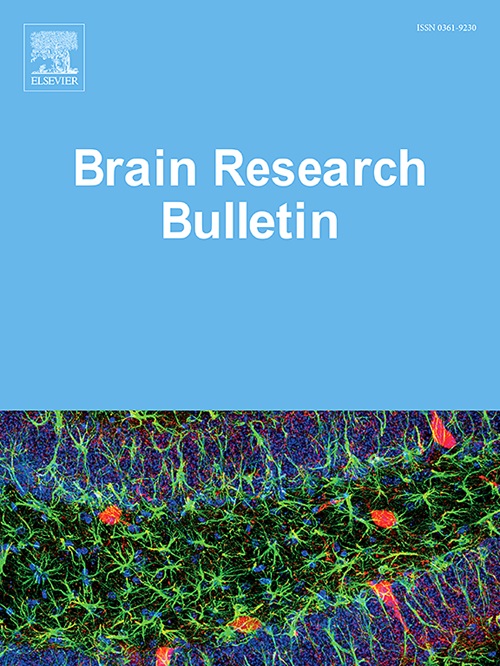SIRT1 通过抑制 drp1 磷酸化调节小胶质细胞表型,减少中暑时的神经炎症
IF 3.5
3区 医学
Q2 NEUROSCIENCES
引用次数: 0
摘要
背景脑损伤常常导致高死亡率和严重的中暑(HS)后遗症。我们的研究调查了体外和体内 HS 条件下小胶质细胞的活化状态、表型标志物、促炎细胞因子和活性氧(ROS)的产生。利用高通量测序技术,我们发现 SIRT1 是小胶质细胞表型的潜在调节因子,并观察到腹腔注射 SIRT1 激动剂 SRT-1720 和抑制剂 selisistat 后,SIRT1 可减轻严重中暑诱导的脑损伤。此外,还在体外 BV2 细胞中检测了 SRT-1720 和 selisistat 对线粒体动力学和小胶质细胞表型转变的影响。高通量测序发现,在 HS 条件下,BV2 细胞中 SIRT1 的表达升高。抑制 SIRT1 的表达后,BV2 细胞中促炎细胞因子、iNOS 和 ROS 的表达也相应增加。使用 SIRT1 激动剂 SRT-1720 进行的体内实验表明,通过 Nissl 和 HE 染色评估,HS 对神经元的损伤有所缓解。SIRT1 的激活与线粒体损伤的减轻和线粒体裂变蛋白 Drp1ser616 磷酸化的减少有关。此外,Drp1 抑制剂 Mdivi 逆转了热诱导的小胶质细胞活化。通过抑制线粒体裂变蛋白 Drp1 的磷酸化,SIRT1 有助于减轻神经炎症和中暑诱导的脑损伤的严重程度。本文章由计算机程序翻译,如有差异,请以英文原文为准。
SIRT1 modulates microglia phenotypes via inhibiting drp1 phosphorylation reduces neuroinflammation in heatstroke
Background
Brain injury often results in high mortality rates and significant sequelae following severe heatstroke (HS). Neuroinflammation aggravates HS-induced brain injury, yet the involvement of microglia in heat-induced neuroinflammation deserves further investigation.
Methods
Our study investigated activation status, phenotype markers, production of pro-inflammatory cytokine and reactive oxygen species (ROS) of microglia both in vitro and in vivo under HS. Utilizing high-throughput sequencing, we identified SIRT1 as a potential modulator of microglia phenotype, and observed that SIRT1 alleviated severe heatstroke-induced brain injury following intraperitoneal administration of the SIRT1 agonist SRT-1720 and the inhibitor selisistat. Additionally, the effects of SRT-1720 and selisistat on mitochondrial dynamics and microglial phenotype transition were examined in BV2 cells in vitro.
Results
Heatstroke promotes microglia activation, as evidenced by the increased production of pro-inflammatory cytokine and reactive oxygen species. High-throughput sequencing revealed elevated expression of SIRT1 in BV2 cells under HS. Upon inhibition of SIRT1 expression, there was a corresponding increase in pro-inflammatory cytokine, iNOS, and ROS expression in BV2 cells. In vivo experiments with the SIRT1 agonist SRT-1720 showed a mitigation of neuron injury under HS, as assessed by Nissl and HE staining. Activation of SIRT1 was associated with a reduction in mitochondrial injury and a decrease in the phosphorylation of mitochondrial fission protein Drp1ser616. Furthermore, the heat-induced activation of microglia was reversed by the Drp1 inhibitor, Mdivi.
Conclusions
Our findings provided evidence that SIRT1 played a crucial role in inhibiting heat stress-induced microglial activation. By suppressing the phosphorylation of mitochondrial fission protein Drp1, SIRT1 contributed to the reduction of neuroinflammation and severity of heatstroke-induced brain injury.
求助全文
通过发布文献求助,成功后即可免费获取论文全文。
去求助
来源期刊

Brain Research Bulletin
医学-神经科学
CiteScore
6.90
自引率
2.60%
发文量
253
审稿时长
67 days
期刊介绍:
The Brain Research Bulletin (BRB) aims to publish novel work that advances our knowledge of molecular and cellular mechanisms that underlie neural network properties associated with behavior, cognition and other brain functions during neurodevelopment and in the adult. Although clinical research is out of the Journal''s scope, the BRB also aims to publish translation research that provides insight into biological mechanisms and processes associated with neurodegeneration mechanisms, neurological diseases and neuropsychiatric disorders. The Journal is especially interested in research using novel methodologies, such as optogenetics, multielectrode array recordings and life imaging in wild-type and genetically-modified animal models, with the goal to advance our understanding of how neurons, glia and networks function in vivo.
 求助内容:
求助内容: 应助结果提醒方式:
应助结果提醒方式:


